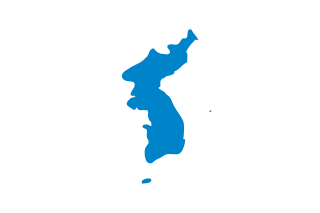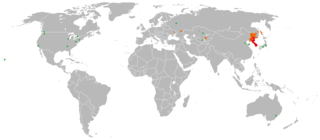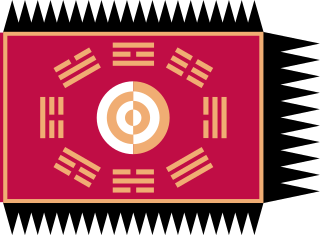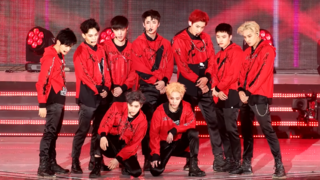Related Research Articles

Korea is a region in East Asia. Since 1948, it has been divided between two distinct sovereign states: North Korea and South Korea. Korea consists of the Korean Peninsula, Jeju Island, and several minor islands near the peninsula. Korea is bordered by China to the northwest, Russia to the northeast, and neighbours Japan to the east by the Korea Strait and the Sea of Japan.

The Korean language is an East Asian language spoken by about 80 million people. It is a member of the Koreanic language family and is the official and national language of both Koreas: North Korea and South Korea, with different standardized official forms used in each territory. It is also one of the two official languages in the Yanbian Korean Autonomous Prefecture and Changbai Korean Autonomous County of Jilin province, China. Historical and modern linguists classify Korean as a language isolate; however, it does have a few extinct relatives, which together with Korean itself and the Jeju language form the Koreanic language family. This implies that Korean is not an isolate, but a member of a micro-family. The idea that Korean belongs to the controversial Altaic language family is discredited in academic research. Korean is agglutinative in its morphology and SOV in its syntax.

The Korean War was a war between North Korea and South Korea. The war began on 25 June 1950 when North Korea invaded South Korea following a series of clashes along the border.

North Korea, officially the Democratic People's Republic of Korea, is a country in East Asia constituting the northern part of the Korean Peninsula, with Pyongyang the capital and the largest city in the country. The name Korea is derived from Goguryeo which was one of the great powers in East Asia during its time, ruling most of the Korean Peninsula, Manchuria, parts of the Russian Far East and Inner Mongolia, under Gwanggaeto the Great. To the north and northwest, the country is bordered by China and by Russia along the Amnok and Tumen rivers; it is bordered to the south by South Korea, with the heavily fortified Korean Demilitarized Zone (DMZ) separating the two. Nevertheless, North Korea, like its southern counterpart, claims to be the legitimate government of the entire peninsula and adjacent islands.

South Korea, officially the Republic of Korea (ROK), is a country in East Asia, constituting the southern part of the Korean Peninsula and lying to the east of the Asian mainland. The name Korea is derived from Goguryeo which was one of the great powers in East Asia during its time, ruling most of the Korean Peninsula, Manchuria, parts of the Russian Far East and Inner Mongolia, under Gwanggaeto the Great. South Korea lies in the north temperate zone and has a predominantly mountainous terrain. It comprises an estimated 51.4 million residents distributed over 100,363 km2 (38,750 sq mi). Its capital and largest city is Seoul, with a population of around 10 million.
Korean may refer to:

Hanja is the Korean name for Chinese characters. More specifically, it refers to those Chinese characters borrowed from Chinese and incorporated into the Korean language with Korean pronunciation. Hanja-mal or Hanja-eo refers to words that can be written with Hanja, and hanmun refers to Classical Chinese writing, although "Hanja" is sometimes used loosely to encompass these other concepts. Because Hanja never underwent major reform, they are almost entirely identical to traditional Chinese and kyūjitai characters, though the stroke orders for some characters are slightly different. For example, the characters 教 and 研 are written as 敎 and 硏. Only a small number of Hanja characters are modified or unique to Korean. By contrast, many of the Chinese characters currently in use in Japan and Mainland China have been simplified, and contain fewer strokes than the corresponding Hanja characters.

Joseon dynasty was a Korean dynastic kingdom that lasted for approximately five centuries. It was founded by Yi Seong-gye in July 1392 and was replaced by the Korean Empire in October 1897. It was founded following the aftermath of the overthrow of Goryeo in what is today the city of Kaesong. Early on, Korea was retitled and the capital was relocated to modern-day Seoul. The kingdom's northernmost borders were expanded to the natural boundaries at the rivers of Amnok and Tuman through the subjugation of the Jurchens. Joseon was the last dynasty of Korea and its longest-ruling Confucian dynasty.

Korea under Japanese rule began with the end of the short-lived Korean Empire in 1910 and ended at the conclusion of World War II in 1945. Japanese rule over Korea was the outcome of a process that began with the Japan–Korea Treaty of 1876, whereby a complex coalition of the Meiji government, military, and business officials sought to integrate Korea both politically and economically into the Empire of Japan. A major stepping-stone towards the Japanese occupation of Korea was the Japan–Korea Treaty of 1905, in which the then-Korean Empire was declared a protectorate of Japan. The annexation of Korea by Japan was set up in the Japan–Korea Treaty of 1910, which was never actually signed by the Korean Regent, Gojong.

Korean Broadcasting System (KBS) is the national public broadcaster of South Korea. It was founded in 1927, and operates radio, television, and online services, being one of the biggest South Korean television networks.
K-pop is a genre of popular music originating in South Korea. While the modern form of K-pop can be traced back to the early 90s, the term itself has been popularized since the 2000s, replacing the term Gayo (가요), which also refers to domestic pop music in South Korea. Although it generally indicates "popular music" within South Korea, the term is often used in a narrower sense to describe a modern form of South Korean pop that is influenced by styles and genres from around the world, such as experimental, jazz, gospel, hip hop, R&B, reggae, electronic dance, folk, country, and classical on top of its traditional Korean music roots. The more modern form of the genre emerged with the formation of one of the earliest K-pop groups, Seo Taiji and Boys, in 1992. Their experimentation with different styles and genres of music and integration of foreign musical elements helped reshape and modernize South Korea's contemporary music scene.

Korean dramas, or K-dramas, are television series in Korean language, made in South Korea.

Kim Jong-un is a North Korean politician serving as Supreme Leader of North Korea since 2011 and also serving as the Chairman of the Workers' Party of Korea since 2012. Kim is the second child of Kim Jong-il (1941–2011) and Ko Yong-hui (1952–2004). He is the grandson of Kim Il-sung, who was the first leader of North Korea from 1948 to 1994. Kim is the first North Korean leader who was born after the country's founding.

Seoul, officially the Seoul Special City, is the capital and largest metropolis of South Korea. With surrounding Incheon metropolis and Gyeonggi province, Seoul forms the heart of the Seoul Capital Area. Seoul is ranked as the fourth largest metropolitan economy in the world and is larger than London and Paris.

Kim Il-sung was the first leader of North Korea which he ruled from the country's establishment in 1948 until his death in 1994. He held the posts of Premier from 1948 to 1972 and President from 1972 to 1994. He was also the leader of the Workers' Party of Korea (WPK) from 1949 to 1994. Coming to power after the end of Japanese rule in 1945, he authorized the invasion of South Korea in 1950, triggering an intervention in defense of South Korea by the United Nations led by the United States. Following the military stalemate in the Korean War, a ceasefire was signed on 27 July 1953. He was the second longest-serving non-royal head of state/government in the 20th century, in office for more than 48 years.

Exo is a South Korean–Chinese boy band based in Seoul, with nine members: Suho, Baekhyun, Chanyeol, D.O., Kai, Sehun, Xiumin, Lay, and Chen. The band was formed by SM Entertainment in 2011 and debuted in 2012. Their music incorporates genres like pop, hip-hop, and R&B, alongside electronic dance music genres like house, trap, and synth-pop. Exo releases and performs music in Korean, Mandarin, and Japanese. The band ranked as one of the top five most influential celebrities on the Forbes Korea Power Celebrity list each year from 2014 to 2018, and have been named "the biggest boy band in the world" and the "kings of K-pop" by the media.

BTS, also known as the Bangtan Boys, is a seven-member South Korean boy band formed by Big Hit Entertainment in 2013. The name became a backronym for Beyond the Scene in July 2017. The band won several New Artist of the Year awards for the track "No More Dream" and gained prominence with their subsequent albums Dark & Wild (2014), The Most Beautiful Moment in Life, Part 2 (2015) and The Most Beautiful Moment in Life: Young Forever (2016). The latter two entered the U.S. Billboard 200, and The Most Beautiful Moment in Life: Young Forever won the Album of the Year award at the 2016 Melon Music Awards.

The Korean alphabet, known as Hangul, has been used to write the Korean language since its creation in the 15th century by King Sejong the Great. It may also be written as Hangeul following the standard Romanization.

Samsung is a South Korean multinational conglomerate headquartered in Samsung Town, Seoul. It comprises numerous affiliated businesses, most of them united under the Samsung brand, and is the largest South Korean chaebol.
References
- ↑ "North Korea - List of Champions". www.rsssf.com. Retrieved 15 November 2018.
| This article about a North Korean football competition is a stub. You can help Wikipedia by expanding it. |